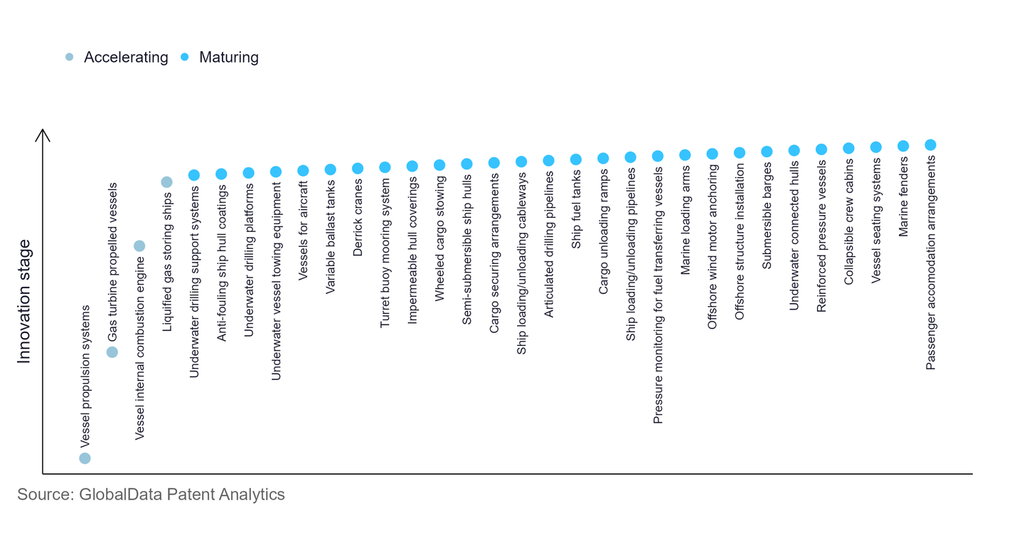The shipping industry continues to be a hotbed of innovation, with activity driven by increasing global trade and commerce and the need for efficient, cost-effective, and environmentally sustainable sea transportation solutions, as well as the growing importance of technologies such as the Internet of Things (IoT), artificial and augmented intelligence, advanced vessel operation monitoring systems, and hydrogen fuel cells.
In the last three years alone, there have been over 67,000 patents filed and granted in the shipping industry, according to GlobalData’s report on Innovation in Ship: Vessel propulsion systems.
However, not all innovations are equal and nor do they follow a constant upward trend. Instead, their evolution takes the form of an S-shaped curve that reflects their typical lifecycle from early emergence to accelerating adoption, before finally stabilising and reaching maturity.
Identifying where a particular innovation is on this journey, especially those that are in the emerging and accelerating stages, is essential for understanding their current level of adoption and the likely future trajectory and impact they will have.
30+ innovations will shape the shipping industry
According to GlobalData’s Technology Foresights, which plots the S-curve for the shipping industry using innovation intensity models built on over 25,000 patents, there are 30+ innovation areas that will shape the future of the industry.
Vessel propulsion systems, gas turbine-propelled vessels, and vessel internal combustion engines are some of the accelerating innovation areas, where adoption has been steadily increasing. Among maturing innovation areas are underwater drilling support systems and anti-fouling ship hull coatings, which are now well-established in the industry.
Innovation S-curve for the shipping industry

Vessel propulsion systems is a key innovation area in shipping
The vessel propulsion system refers to the mechanism of generating thrust to move a watercraft through the water. It can be as simple as a diesel engine directly connected to a propeller shaft to drive the propeller, or more complex systems using diesel or dual fuel engines for generating electricity to propel the vessel.
GlobalData’s analysis also uncovers the companies at the forefront of each innovation area and assesses the potential reach and impact of their patenting activity across different applications and geographies.
According to GlobalData, there are 10 companies, spanning technology vendors, established shipping companies, and up-and-coming start-ups, engaged in the development and application of vessel propulsion systems.
‘Application diversity’ measures the number of different applications identified for each relevant patent and broadly splits companies into either ‘niche’ or ‘diversified’ innovators.
‘Geographic reach’ refers to the number of different countries each relevant patent is registered in and reflects the breadth of geographic application intended, ranging from ‘global’ to ‘local’.
Patent volumes related to vessel propulsion systems
Daewoo Shipbuilding & Marine Engineering (DSME), a company based in South Korea, is the leading patent filer in vessel propulsion systems. Most of the patents filed by the company in this space are related to liquefied fuel gas propulsion systems, and systems and methods of recovering, treating, and using boil-off gas as the fuel for a ship.
In September 2022, DSME signed a memorandum of understanding (MOU) with the Norwegian shipping class society DNV to jointly develop wind-assisted propulsion systems featuring a rotor sail solution for ships.
Other leading patent filers in the vessel propulsion systems space include Hyundai Heavy Industries, Samsung Heavy Industries, and Kawasaki Heavy Industries.
In terms of application diversity, DongHwa Entec leads the pack, followed by Kobe Steel and Linde. By geographic reach, Linde is the leading company, followed by Mitsubishi Heavy Industries and Kawasaki Heavy Industries.
To further understand the key themes and technologies disrupting the shipping industry, access GlobalData’s latest thematic research report on Shipping.
GlobalData, the leading provider of industry intelligence, provided the underlying data, research, and analysis used to produce this article.
GlobalData’s Deals Database tracks global deal activity, including mergers, acquisitions, capital raising, strategic alliances, and licensing agreements. Proprietary analysis is used to group deals into key thematic areas and granular sectors across the world’s largest industries.
This analysis considers only announced and completed deals from the GlobalData financial deals database and excludes all terminated and rumoured deals. Deal type includes Acquisition, Asset transactions and Mergers.